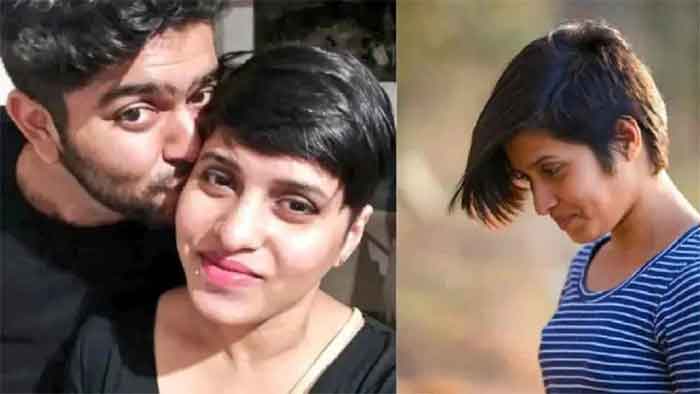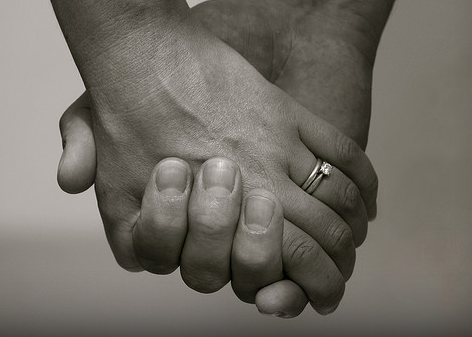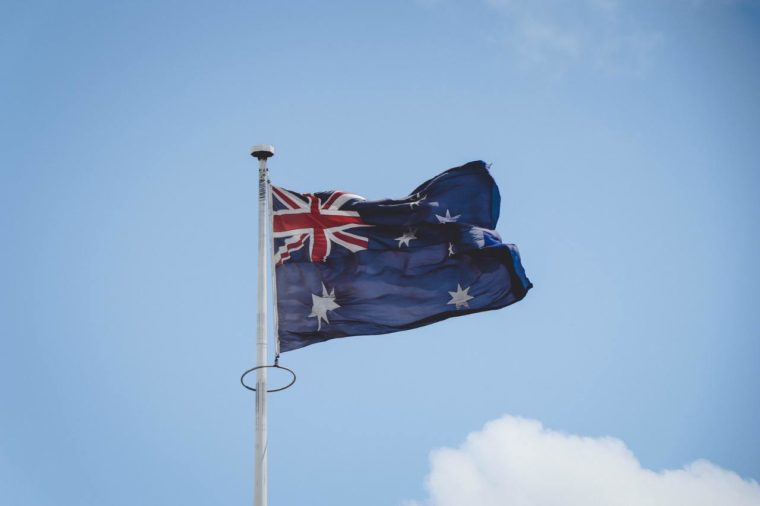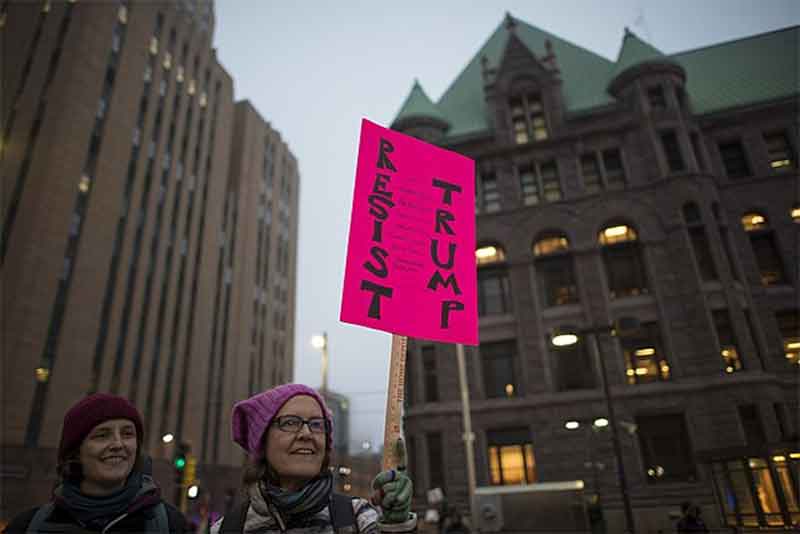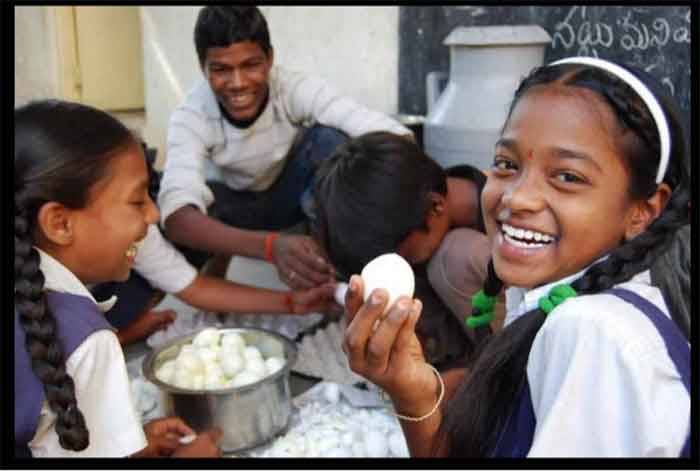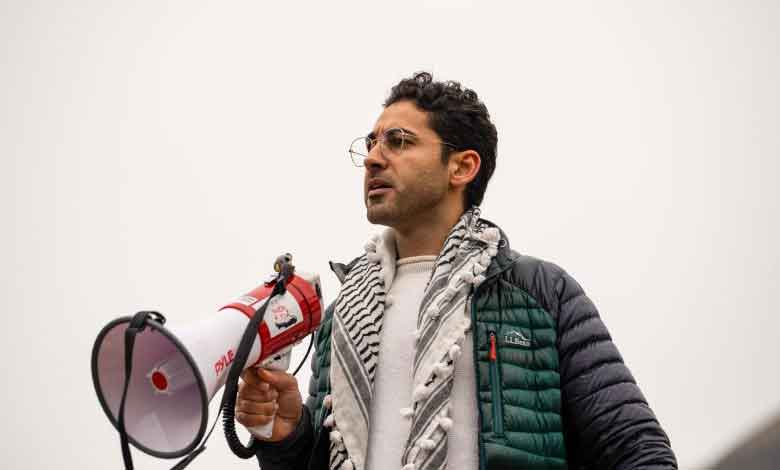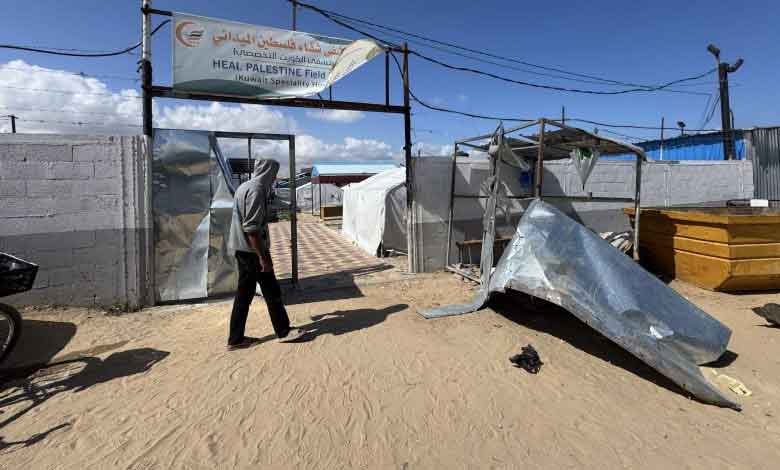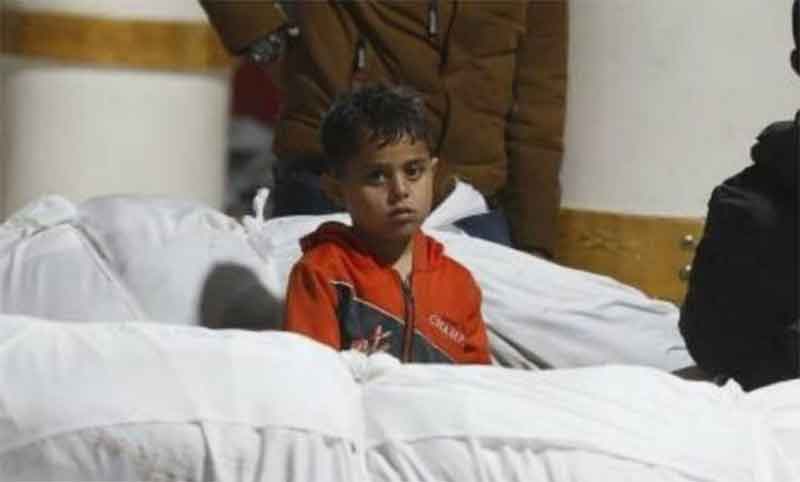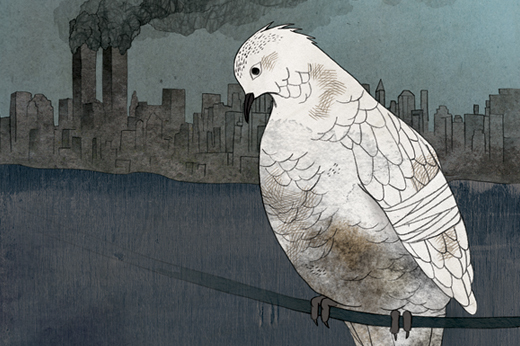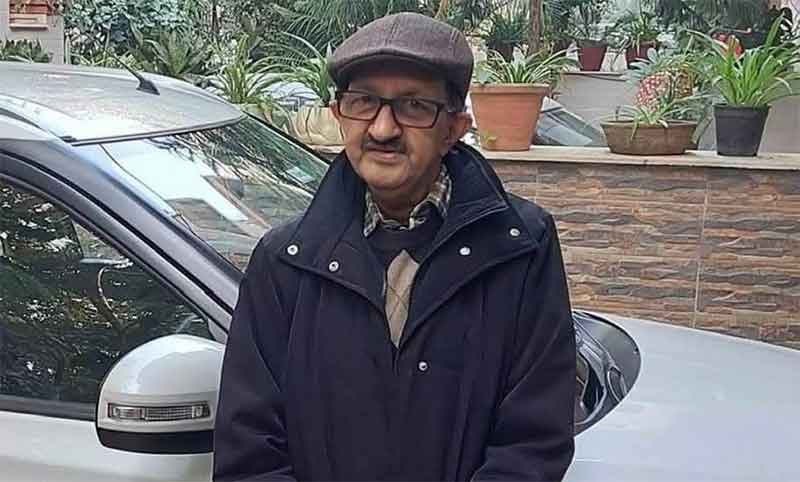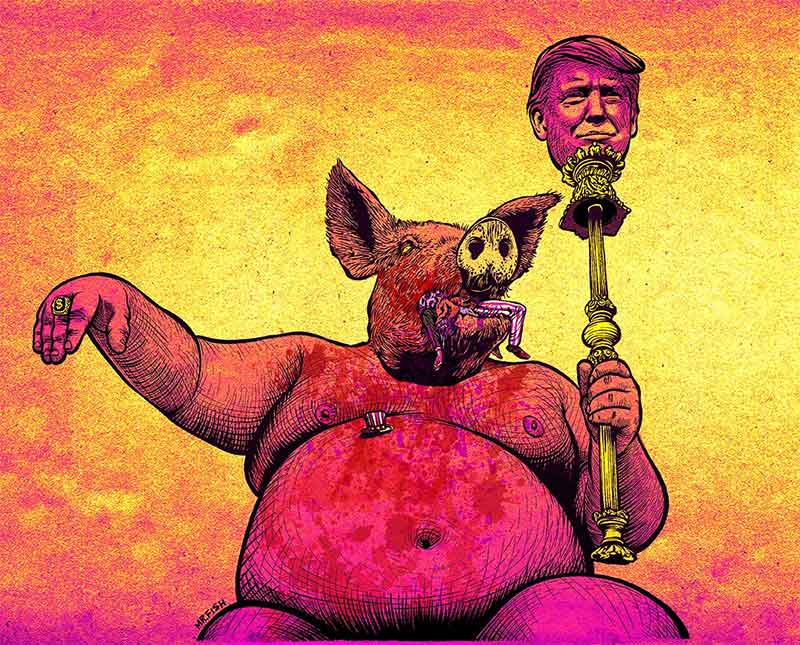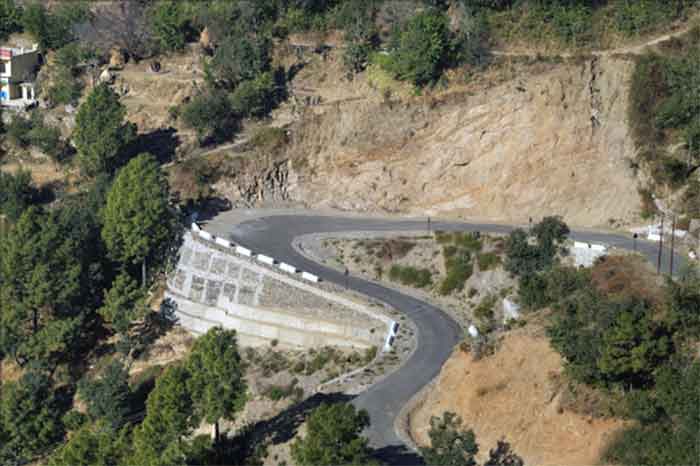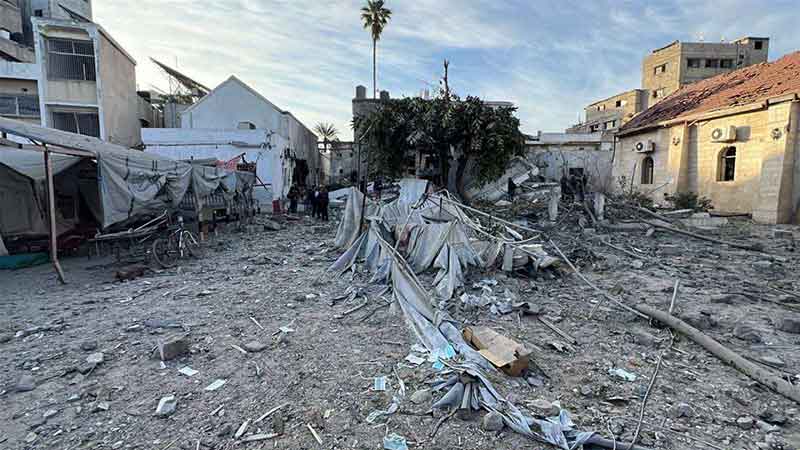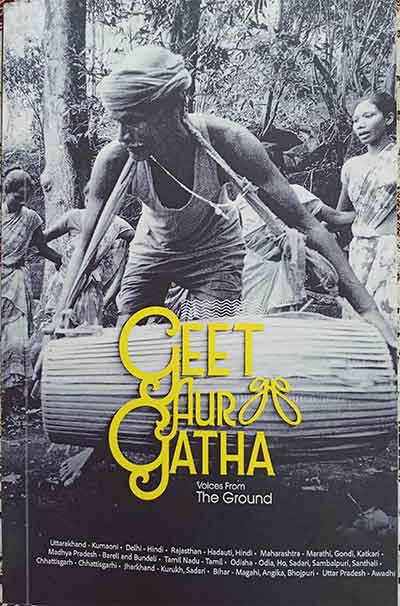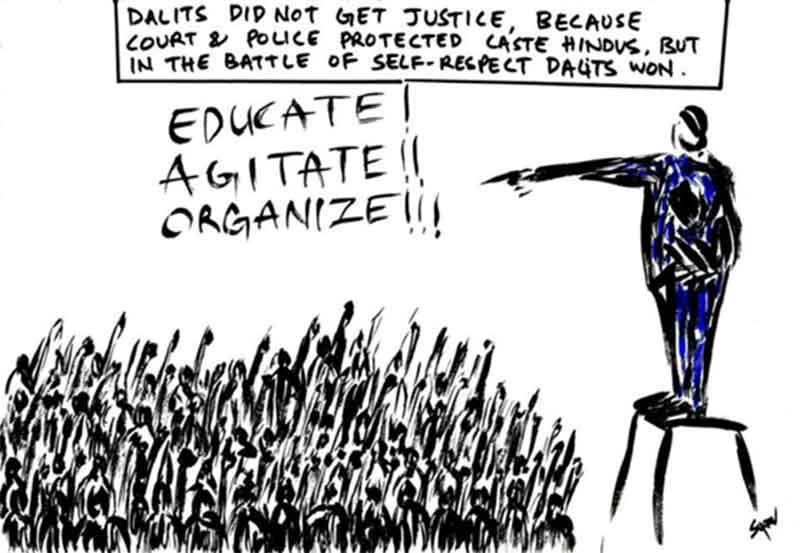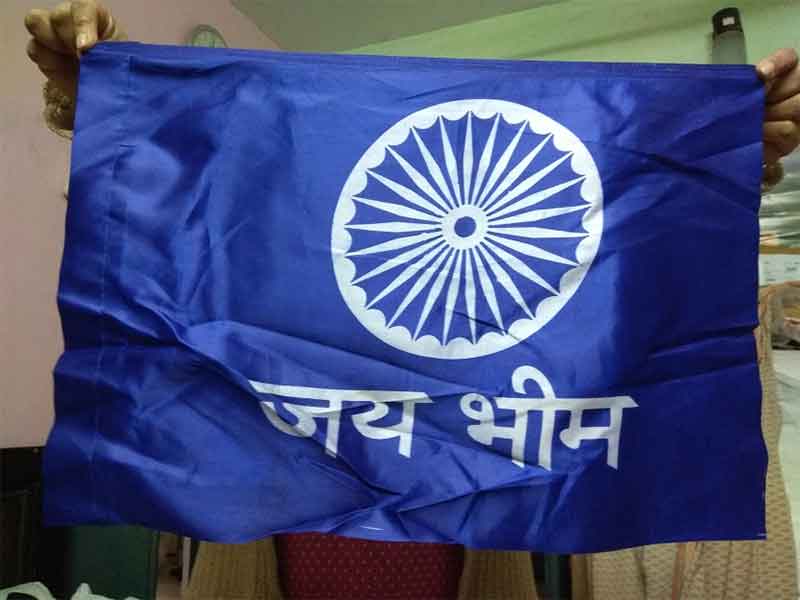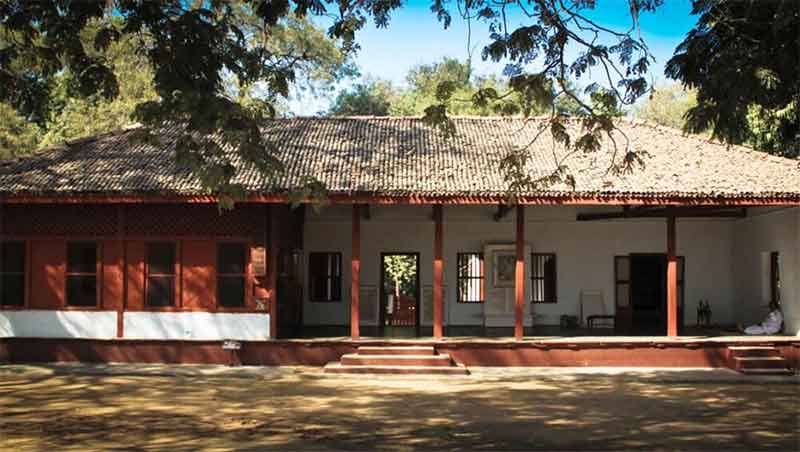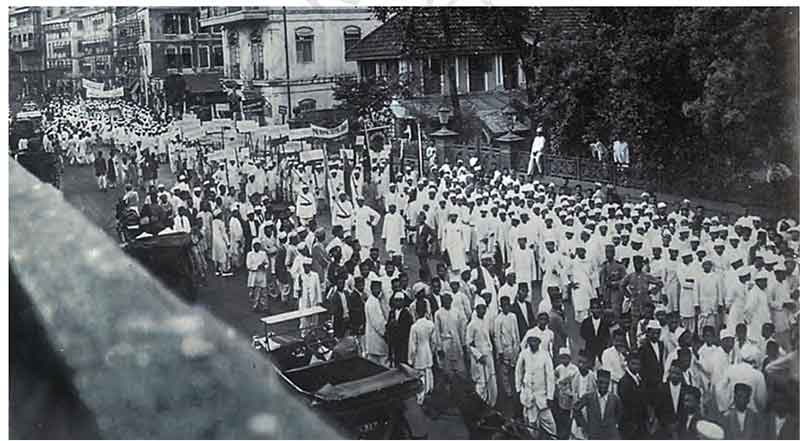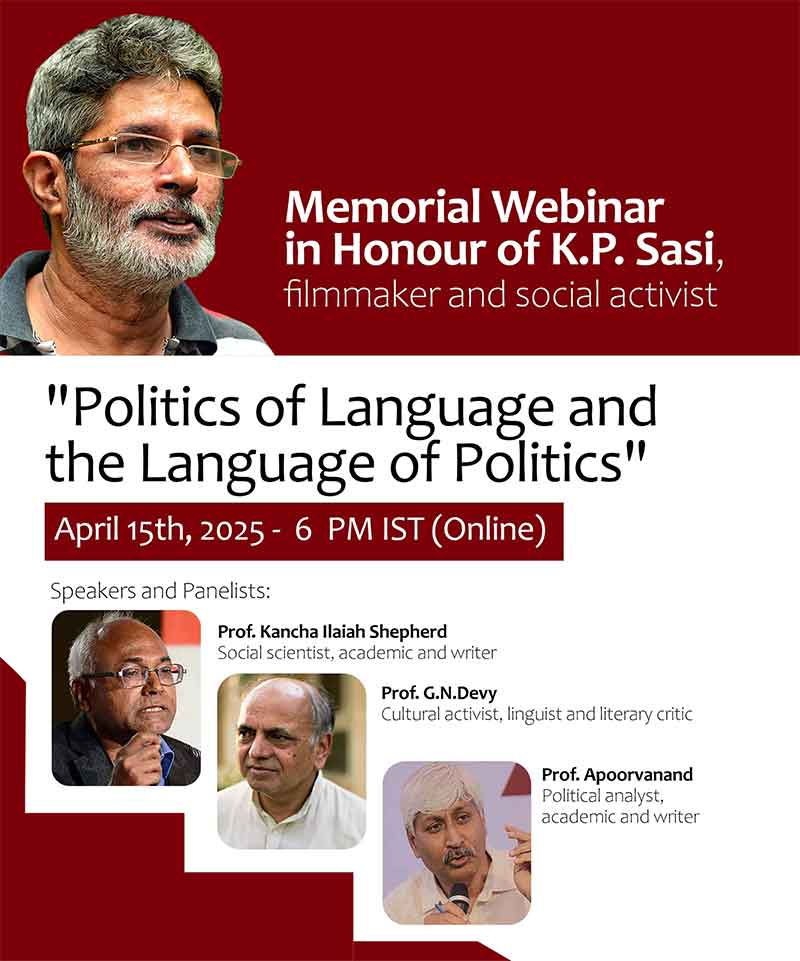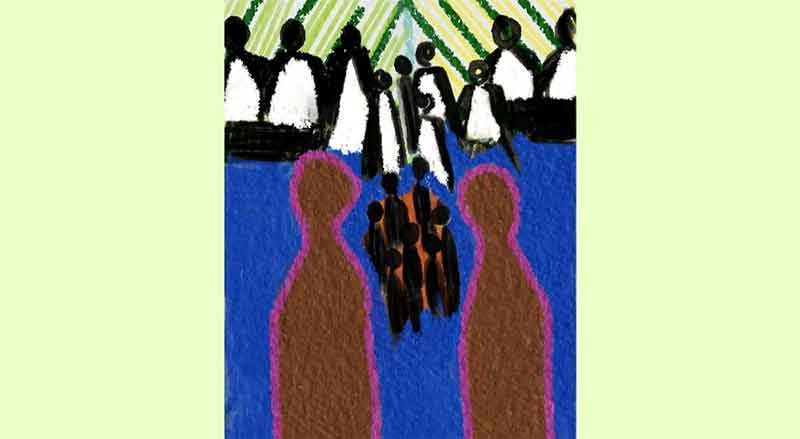
Love Jihad is a propaganda that accuses Muslim men for converting Hindu women to Islam, using money, and are sometimes accused of alluring women hiding their real identity. It’s been almost two decades since the Sangh Parivar began using this as a tool for communalizing and polarizing communities. Few media reports carry evidence that the love jihad campaign stems from a manufactured fear and phobia against interfaith and inter caste marriages, as a threat to dominant caste communities. They also presented ‘love jihad’ as part of a global propaganda to destroy social security of Kerala. Presenting Love Jihad as a means to alter the demography in India exposes the racial nature of this campaign. The base of this is creating a ‘racial other’ and legalizing it to place the national politics around it. Through communalizing even gender-based crimes, Hindutva organizations are keeping this campaign alive. This report enquires the origins and growth of the love jihad campaign.
Hindutva projects that spread anti Muslim hatred are in various, intertwined forms. So, it is difficult to clearly point out where the love jihad campaign began. But reports from the state and the media reveal that it was from the Southern Indian states Kerala and Karnataka Love Jihad was shaped into a nationwide campaign. The beginning of this campaign can be traced back to Karnataka in the late 1990s. In the investigative report series by journalist Greeshma Kuthar, ‘How Coastal Karnataka was Saffronised?’ that was published in FirstPost.com, one is about the origins of Love Jihad. In this report she maps various incidents where Love Jihad was accused and resulted in physical assaults and police interventions and moral policing. This report observes that as the BJP came in Karnataka in 2008, this campaign gained authenticity.
Greeshma observes how in the 1990s the native communities were targeted in Karnataka with the love jihad propaganda.
In 2009, Selvaraj, a father, approached the Karnataka High Court accusing love jihad in his daughter’s marriage. Since the man Silja Raj married was Kerala’s Kannur native, Karnataka state’s investigation extended to Kerala as well, this didn’t bring any new evidence to establish the love jihad accusation. The state CID’s investigation into the marriage of Silja and Asgar too didn’t bring any evidence of love jihad.
First allegation of love jihad reached the Kerala High Court in 2009. In ‘Haindava Keralam’ website there are more than fifty reports about love jihad that have been published since 2009. When we examine the history of love jihad in Kerala the participants are vivid, it ranges from the popular print, television media to individuals, political leaders, Hindutva organizations etc. Love Jihad is not a campaign that originated regionally but it is an organized project being implemented as part of a national Hindutva agenda.
Hindu Janajagruti Samiti, a Hindutva website, initiated an active campaign for Love Jihad in 2009. This website is related to Sanathan Sanstha, a Hindu militant organization that is accused in several terror cases including murder and bomb blasts. The description in the website is, ‘for the establishment of Hindu rashtra’.The website gives warnings to Hindu parents to look after their daughters citing various imminent threats if they let Hindu girls to be close with Muslim men. It further states that Hindu girls will be used to make babies, with an intention to increase the Muslim population. It further alerts the phone numbers of Hindu girls will be shared from mobile recharge shops, and the matrimonial websites too. It states that Muslim men who follow polygamy will abandon them after marriage. A book written by Ramesh Shinde and Mohan Gowda named, ‘Love Jihad Threat to Hindu Dharma and remedies’, published by Hindu Janajagruti Samiti was circulated to Hindu households. The Hindu Janajagruti Samiti stated that they aim to declare India as a Hindu rashtra.
How did the love jihad campaign gain ground in Kerala?
While considering the bail plea submitted by Shahan Shah and Sirajuddeen from Pathanamthitta in December 2009, the Kerala High Court made a judgment hinting that there possibly could be the threat of ‘love jihad’. The complaint against Shahan Shah and Sirajuddeen was that they forcefully converted their lovers from different faiths, Christian and Hindu, the complainants were the women’s families. Following this, the judge KT Shankaran ordered the DGP to submit an enquiry report on whether there was ‘Romeo Jihad’/ ‘Love Jihad’ in Kerala before. The judge directed the home ministry to provide details about such incidents. Even when the women testified before the division bench that their conversion to Islam was not forceful, the High court judge refused to consider this statement in this bail application.
“There is no organization functioning in Kerala under the name Love Jihad or Romeo Jihad. There is no organization actively doing forceful conversions. There is no evidence for such activities happening amidst school or college students. There are no complaints against forceful conversions in love relationships registered,” the police report states.
The court in its judgment stated that there are conversions happening as many as interfaith marriages happening and no police agency has data on the details and numbers of those. The court stated it had reasons to doubt such attempts citing ‘unconfirmed information that certain groups are working to encourage religious conversion amongst the youth’. This part of the judgment is incomplete in its information and sounds prejudiced.
The same judgment describes the police report submitted by the DGP provides no evidence to substantiate that doubt, that means there is no evidence of love jihad in Kerala. The report carries data from all the districts. The judgment raises allegations against some Muslim political organizations that they are carrying out conversion. The question remains, despite the police report clearing all the doubts about the existence of love jihad, why did the judge make such statements.
The judgment expresses another anxiety- if one of the two in an interfaith relationship accepts the religion of the partner, in such cases it is not the love, but the religion that comes in front. This judgment underlines the rights of parents over their adult children pointing at several laws that protect the rights of parents.
But in another phase of this case, an order nullifies this case. In 2010 Justice M Shashidharan Nambiar pronounced a very short order stating ‘petitions are dismissed as infructuous’. In the book ‘Love Jihad and Other Fictions’ written by Mariyam Alavi, Srinivasan Jain and Supriya Sharma, the authors interviewed Justice Shashidharan about this. Shashidharan tells them he ‘regrets not writing a judgment’ in the case. The book reminds us that this judge grieves his lapse and tells us this is the reality when ‘justice KT Shankaran’s judgment is often cited both inside and outside the court as an evidence that signals there is merit in love jihad theory’. It is important to remember at several occasions BJP leaders including Smrithi Irani and Yogi Adityanath credited Kerala High Court for problematizing ‘love jihad’.
When asked what he thinks about the ongoing campaigns on love jihad, the former DGP Jacob Punnoose who concluded that there is no ‘love jihad’ happening in Kerala responded, “it is all created by you media persons!”, when this reporter clarified her intention to make such a phone call, he further informed that he still thinks his finding stands intact. There is no Jihad in love, when parents oppose interfaith marriages, some parties come up to help them. There could possibly be groups with some anti-national intentions, this is how I reported, he said. But the court’s reaction to this report was strange. Without stressing more on Jacob Punnoose’s findings, Justice Shankaran suggested the state enact law to prevent forceful religious conversion like in some other Indian states.
Dr K Ashraf, a writer, scholar and university professor hailing from Kerala, whose reports and studies on Islamophobia analyze the social origins and implications of Islamophobic campaigns writes about ‘The Kerala Story’. In his article named ‘The Kerala Story: Secular yet Nationalistic and Islamophobic’(published in Berkely Centre for Religion, Peace and World Affairs), he observes that more than the secular political parties it was the secular media that magnified the ‘love jihad’ campaign. “Contrary to the film’s claims, data from the Indian government has refuted the notion that a large number of Keralan women have joined ISIS. Official figures suggest that only a small fraction of Indians, around 100 to 200 individuals, have joined, with even fewer from Kerala”he writes. The Hindutva controlled newspaper Janmabhumi reported on the arrival of Romeo Jihad in 2006, he wrote. He observes how the political landscape of Kerala adapted the Hindutva propaganda gradually.
“However, LDF involvement with these Muslim minority movements, perceived as being anti Hindutva, ignited controversy and invited criticism. The government’s coalition with the PDP, INL, and Jamaat-e-Islami was frequently portrayed as a “communal,” “fundamentalist,” and “Islamist” takeover of politics within the wider discourse of secularism in Kerala. In addition to these ideological concerns, the increased participation of the Muslim minority within the LDF government gave rise to heightened social tensions in Kerala. Issues relating to community representation and equitable distribution of economic and social resources surfaced. This evoked significant apprehension among traditional Hindu and Christian communities in Kerala. Thus, Love Jihad propaganda gained entry into Kerala through various Hindutva organizations.
The popularity of this propaganda in Kerala did not primarily stem from the secular political parties, but rather from the influence of the secular media. During this era, Love Jihad received extensive coverage in two prominent Malayalam newspapers: Malayala Manorama, one of the most widely circulated newspapers across Indian-language media platforms; and Kerala Kaumudi, another influential Malayalam-language daily newspaper originating from Kerala.
Historically, Manorama has shown political support for the Indian National Congress (INC), while Kaumudi has aligned itself with the CPI(M). These affiliations can be traced back to the traditional inclinations of the Christian community towards the INC and the Ezhava community towards the CPI(M). By actively participating in the creation and dissemination of the Love Jihad narrative, Manorama and Kaumudi played pivotal roles in shaping public perception, opinion, and understanding of the phenomenon. Intriguingly, Malayala Manorama disengaged from the Love Jihad campaign in 2012 due to substantial political protests and backlash it faced from various Muslim minority movements and secular political groups in Kerala. However, Kaumudi has continued to exhibit its Hindutva leanings and remains involved in the campaign.” Dr K Ashraf writes.
Unforgettably, in 2010 Kerala chief minister V S Achyuthanandan made this controversial statement about Kerala, “In twenty years Kerala will become a Muslim country, a Muslim majority country. Youngsters are all influenced, provide money to them and convert them to Islam, marry Muslim women, birth Muslim, like that…make the Muslim community a majority. This is what they are implementing.” This statement is a reflection of Islamophobic narratives that are centered around the false narrative on population.
Media propaganda
The print, visual media in Kerala holds a major role in establishing ‘love jihad’, a baseless allegation as real in the public conscience. Continuous news publishing on love jihad without fact checking and lack of sensitivity while approaching certain incidents that require specific sensibility are the news policy practiced by Malayalam media. It can be seen in the initial phase of reporting on love jihad, where in the campaign is presented as must-trust, evidence-based crime, the sources of reporting are kept secret. Like, under the category of state intelligence information. An article titled ‘Love Jihad, Conversion and Fraudulent Money to Destroy Kerala’ published in Malayalam weekly Kala Kaumudi by V D Selvaraj in 2012 June, presented ‘love jihad’ as an attempt to destroy the existing social structure. It says that Indian intelligence agencies got the blueprint of a foreign separatist group that targets Muslims in Kerala to separate them from the society and this section will separate five percent of SC,ST population to keep along with them. By the use of fraudulent money they plan to destroy the social security of Kerala, convert the poor and convert in the guise of love. It states an unrealistic digit of 6000 persons who converted like this from 2006.
Selvaraj’s article makes it evident that this campaign not just aims at Hindu women and Muslim men. The ‘leaked document’ Selvaraj quoted apparently carried other sensitive information like, the migration of laborers from other states, transaction of fraud money through them, separatists intruding public politics and parties, Maoist training in the forests and foreign funding to community organizations as stated in his report. Then the reporter takes it to the question of population. Suggesting that the Muslim population that couldn’t find a deserving voice in the society even with a considerable increase in the population, requires the support of Hindu society. From the Hindu population that is around 55%, separating a five percent from Hindu society to be part of Muslim population will make them stronger. The reporter makes a more vicious statement here saying that investigations reveal that the targeted communities who are ‘untouchables’ are more in affinity with the Muslim population than to the upper caste Hindus.The fear against migrant Muslims from Bengal is openly expressed here, the report says these migrant Muslims are empowering themselves by ‘gaining voting powers and with an ability to alter Malayali’s food habits’. The article carries information under segregated categories of conversion under caste lines. In the absence of evidence all these remain fake news. The reporter even questions the 2009 DGP report and raises doubts about its authority, he further writes that this affidavit is wrong. Selvaraj’s report was republished in several Hindutva websites including Hindu Janjagruti Samiti.
Kerala can’t easily forget the young woman who was put under house arrest for embracing Islam. The public trial on Hadiya began based on the political leaning of the person (Popular Front of India), who is a Muslim she married. Hadiya’s conversion which happened before her marriage was presented as a love jihad case, even some Malayali journalists working in national newspapers didn’t bother to do a very basic background check. They all made the case look like a forced conversion and the National Investigation Agency initiated an investigation into it, to ascertain certain assumptions surrounding the Popular Front of India, a banned Muslim political outfit. Hadiya who embraced Islam prior to her marriage in 2016 was targeted for her decision and her conversion was pictured as a ‘preparation to leave the country’ to join ‘global terror activity’. Though Hadiya had opened up her mind in the Supreme Court, before accepting and acknowledging her truth the judges discussed giving some parental instructions to the young woman. Hadiya was ‘set free’ but the NIA investigation continued only to conclude the case with no evidence. The targeting of religious conversion and religious study centers, and criminalizing these, was politically motivated as well and engineered quite loudly in the 2000s, this sociality too worked helpful to criminalize Hadiya’s conversion.
After coming out of the house arrest, Hadiya spoke out about the tortures she endured there. She said that people approached her to do gharwapsi. In 2017 reports came out in Media One tv about a yoga centre in Thripunithura that functions as a torture centre for women who are in interfaith and inter caste relationships, this was revealed for the first time by few survivors. Swetha Haridasan, one of the survivors, submitted an affidavit in the Kerala High Court. There are multiple complaints about the center at different administrative authorities of Kerala. Following this expose, investigation started and a case was filed against five people including the founder of the center Manoj Guruji.
Adv. Rajasimhan who represented the center’s survivors spoke to Keyboard Journal.com in 2019 about how the political executive and police, especially the state and the local political leaders failed to end the functioning of this center. “Delaying justice ultimately benefits the oppressors. The victims either succumb to time or get tired of walking”, Rajasimhan said. Though survivors filed complaints and cases including to the top police officials, even with intact evidence, the Kerala government failed in ensuring justice to the victims and checking the functioning of such an oppressive system. One of the women who has undergone ghar wapsi, and now is associated with this center through Arsha Vidya Samajam, an institution to study and disseminate Sanatana Dharma, later came up as an advocate of Sudipto Sen’s ‘The Kerala story’. The movie created a visual base for the propaganda. Though the Kerala story was resisted widely in the beginning, the OTT release of the movie prior to the Lok Sabha election and Dooradarshan’s telecast pushed it to a wider audience. The Idukki diocese of Syro Malabar Catholic church decided to screen this movie to teenagers to create awareness about the ‘dangers of love’ and asked the students to write a review of it. Maktoob media reports the content of a text book provided for the students. It found that even when there is a police report prepared by Jacob Punnoose that discards Love Jihad, Love Jihad is real. It depicted Muslim men as hypersexual drug addicts, Hindu women as naive, religion study centers as shady and criminal, Kerala college as a terror recruiting center, and carries violent depictions including sexual assault. The audience of the film in the church was teenagers. A complaint was filed against the Church for screening this film to minor students, by the Fraternity movement.
In 2017 DGP Loknath Behera too gave a report that there are no love jihad cases in Kerala. The home ministry itself has stated in the parliament that love jihad cases are not reported. MPs and Hindutva organization leaders repeat that there is no legal definition to love jihad. The Latin Catholic church’s mouthpiece ‘Jeevanaadam’ responded to the Syro Malabar church’s decision to screen the film stating that it is a communalizing attempt by the savarna communities to mold the Christians as ‘absolute Islamophobes’. KJ Sabu, in his article wrote that ‘Vicharadhara’ is prioritized to the Holy Bible.
The Bharatiya Janata Party used Love Jihad as a tool in the Lok Sabha election campaign in an unprecedented manner. They claim love jihad aims at altering demography and accuses the secular government of ‘appeasing’ the minority communities.
Gender based crimes portrayed as ‘Love Jihad’
It has become a norm to portray gender-based crimes as a result of love jihad. In 2022 and 2023 around five incidents of murder of women where they were brutally killed and stuffed in suitcases and abandoned reported in Delhi and some other Indian states. But one such crime was widely discussed- the murder of Shradha Walker who suffered domestic violence in her live-in relationship with Aftab Poonawala. After her murder the right-wing social media accused the liberals of enhancing ‘love jihad’. When the visual and print media were busy reporting the bloody details of the crime, it didn’t do an investigation into the psychological causes behind this kind of crime. Campaigns were directed at the religious identity of the accused, even the custody vehicle Aftab was traveling in was attacked by an armed mob. Shradha’s father said that his daughter is a victim of love jihad underlining his caste location and said that their family is against interfaith marriages.
When increasing crimes against women are ignored, the right-wing ecosystem amplifying communal angles in selected crimes results in more polarizing dangers in a society. The ‘love jihad’ controversy erupted in Utharakhand in 2023 May originated from communally targeting the religious identity of the accused in a gender crime. Even when the accused was arrested the campaign against Muslims continued, resulting in socio economic boycott and Muslims being forced to leave their homes. The ‘dev janma bhumi’ movement originated in Uttarakhand aims to expel Muslims from the state to turn it into a holy land like Mecca or Vatican, Tusha Mittal and Alishan Jafri reported in Coda Story. Ground reports from Karnataka’s Hassan, Hubli and Dharwad about the murder of Neha Hiremath, a college student who was stabbed to death by her Muslim classmate is inflamed into a divisive campaign by the Hindutva organizations. Neha belongs to the Lingayat community and her father is a Congress politician. Madhyamam reporter Iqbal Chennara reported from Dharwad another crime occurred in Karnataka before Neha’s murder where the victim is a Muslim woman named Ruksana and the accused a Hindu man Pradeep Nayak. This crime wasn’t discussed like Neha’s murder. This was a case of marriage betrayal where Pradeep kept it hidden that he is married while being in a relationship and family with Ruksana.
For the Lok Sabha election, Home minister Amit Shah too campaigned in Dharwad accusing the state government for failing in women’s safety. The Karnataka state commission for women chairperson Nagalakshmi Choudhary who visited Neha’s family made a strongly worded statement. She told the family not to let anyone reap political benefit out of this incident. A woman named Ruksana was murdered, the accused is Pradeep Nayak. Neha’s murder shouldn’t be tangled in caste, religion and political agendas, she stated.
The anti-conversion law implemented in 2021 in Uttar Pradesh added a new condition in the special marriage act that asks interfaith marriages to put out a notice prior to two months and to get permission from the magistrate. If anyone uses marriage as a means for conversion they will face a penalty for at least ten years. Eight Indian states have passed anti conversion laws. Professor Ghazala Jameel in her article in The Conversation writes how oppressive India’s anti-conversion laws are towards Muslims. Until 2014, there were more Muslim parliamentarians from India’s most populous state, Uttar Pradesh, she observes. The anti-conversion law in UP aimed to mobilize anti Muslim sentiments in the wake of the state assembly election, she writes. Ghazala Jameel also points out how these laws are criminalizing the conversions Dalit and tribal communities massively engage in. These laws work against the feminist autonomy that is developed through an ongoing fight with the patriarchal system.
“Through such discriminatory law-making, right wing forces in power are seeking to achieve their core agendas.
First, they seek to mobilise anti-minority sentiments by fanning the insecurities of the Hindu majority, polarising people and explicitly disenfranchising Muslim minorities.
Second, they wish to mount a backlash against the gains made by the feminist movement in achieving increased autonomy for women in a patriarchal society.
And last, but not least, they wish to covertly undermine the social mobility of the lower castes and tribal populations.
A repeal of these laws may not be enough to bring about social justice in India, but it is a necessary step.” Ghazala Jamil writes.
Ultimately, India’s anti-conversion laws target all love relationships and conversions that would undermine the brahmin order of social hierarchy.
Mrudula Bhavani is an independent journalist
Originally published in Keraleeyam


